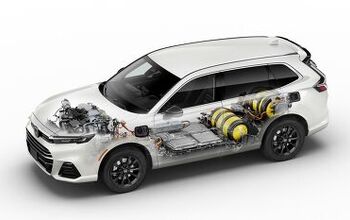Nissan-Renault Relationship Has Not Improved, Despite Assurances to the Contrary

If Nissan and Renault were a living, breathing couple, they’d be the duo all of your other friends whisper about. They’d be the couple with the big house and seemingly successful children that everyone knows fights bitterly in the evenings — screaming at each other before retiring to their separate bedrooms. The relationship, while healthy in terms of financial productivity, has grown toxic on the corporate end of things.
Less than one month after Renault’s new chairman claimed a merger would be out of the question, the French automaker is once again pushing for integration. Nissan is having none of it and plans to reject the proposal outright, according to reports from Nikkei.
France’s government, which holds a 15-percent stake in Renault, has encouraged the automaker to solidify its ties with the Japanese company for years. Despite being largely dependent upon Nissan for new product and strong global sales, Renault owns 43.3 percent of Nissan, while the Japanese firm only holds a 15-percent stake in the French carmaker. It’s clearly in Renault’s best interest to lock Nissan into a legitimate marriage — a trick it has yet to pull off.
Former Alliance head Carlos Ghosn, who was indicted for a fourth time by Japanese prosecutors on Monday, has claimed his incarceration is a direct result of a corporate power struggle with Nissan’s top brass. While the legitimacy of those claims can be debated, there was clearly fallout stemming from his drive to see the pair enter into an “irreversible” partnership. Nissan wants voting rights within the Alliance, something it currently lacks, and has grown increasingly vocal about the issue.
From Nikkei:
For its part, Nissan’s management feels the company has not been treated as Renault’s equal under the existing capital ties. It fears a merger or some form of integration under a holding company would make that inequality permanent, the sources said. [Jean-Dominique] Senard, who took over from Ghosn in March, ruled out talk of a merger in an interview with Nikkei soon after becoming chairman.
“If I were to talk about a merger, it would be to talk about the intelligent merging of our cultures to make the alliance very efficient. All other ideas would not be relevant,” he said. In a separate interview the same month, he also said the companies were not discussing reworking the capital relationship.
Both sides have stressed that the priority since Ghosn’s departure is to repair their alliance, which is the world’s second bigger car producer. But sources said this could now be more difficult.
Nissan’s continued resistance to the concept of a merger highlights the company’s longstanding suspicion of the French government’s intentions. Nissan has repeatedly pushed for an equal capital relationship between the two companies, but has been reluctant to increase its own stake in Renault due to concerns that it could regarded as an aggressive act by the French manufacturer.
However, depending on what you believe happened prior to Ghosn’s initial arrest and how guilty he is, Nissan hasn’t played softball. The company clearly seemed to think that, with him gone, merger talks would evaporate (at least for a while) and it could focus on improving corporate efficiencies without fighting against integration proposals.
Despite Renault being all smiles about the future last month, Nissan was wrong. The French government already said it wanted to see management union under a holding company structure last January. And Renault’s latest merger proposal appeared on Nissan’s doorstep within the past two weeks, according to reports.
At the end of the day, France wants to keep Nissan around to help pad Renault’s global sales and share the cost of developing advanced technologies. Over half of the Renault-Nissan-Mitsubishi Alliance’s annual volume can be attributed to Nissan; the company also managed to outspend Renault on capital investments by $1 billion in 2018.
Japan is having difficulty seeing what’s to be gained on its end. Meanwhile, at-home investors have already expressed concerns over both the possibility of a merger and Renault’s role in the company’s future — Nissan even had an emergency meeting about it. The country’s Ministry of Economy, Trade and Industry was also said to have communicated directly with the French government to ask it to nix an earlier integration proposal against Nissan’s wishes.
“As you could see, the draft is going a little too far even in our view, when the French state is staying quiet,” Nissan’s head of government affairs, Hitoshi Kawaguchi, wrote in a May 2018 message to the Ministry about a memo it sent to France asking to respect the automaker’s independence. “Though support by the Japanese government is appreciated, it is a private company matter at the end of the day.”
What a mess. At this point, it’s hard imagine what the best path forward for either automaker. Renault clearly doesn’t want to lose access to Nissan’s strength, but trying to hold onto it is only making the company less eager to maintain the relationship.
[Image: Nissan]

A staunch consumer advocate tracking industry trends and regulation. Before joining TTAC, Matt spent a decade working for marketing and research firms based in NYC. Clients included several of the world’s largest automakers, global tire brands, and aftermarket part suppliers. Dissatisfied with the corporate world and resentful of having to wear suits everyday, he pivoted to writing about cars. Since then, that man has become an ardent supporter of the right-to-repair movement, been interviewed on the auto industry by national radio broadcasts, driven more rental cars than anyone ever should, participated in amateur rallying events, and received the requisite minimum training as sanctioned by the SCCA. Handy with a wrench, Matt grew up surrounded by Detroit auto workers and managed to get a pizza delivery job before he was legally eligible. He later found himself driving box trucks through Manhattan, guaranteeing future sympathy for actual truckers. He continues to conduct research pertaining to the automotive sector as an independent contractor and has since moved back to his native Michigan, closer to where the cars are born. A contrarian, Matt claims to prefer understeer — stating that front and all-wheel drive vehicles cater best to his driving style.
More by Matt Posky
Latest Car Reviews
Read moreLatest Product Reviews
Read moreRecent Comments
- Rochester When I was young, a number of girls I dated wanted to own a Jeep. I didn't understand (and don't like them myself), but it was certainly something. So good for Jeep leaning into that.
- 3SpeedAutomatic Elon took his eye off the ball while pre-occupied with "X" (formerly Twitter). Now, Tesla is coming around and biting him on the arse!!In the car business, you need to keep you finger on the pulse. Momentum will only carry you so far. If in doubt, think Lordstown and Fisker. He thinks technology will solve his problems. However, Telsa has moved from premier product to commodity with other manufacturers entering his exclusive domain. Time for Elon to fly back to Tesla HQ and come up with a long term plan. 🚗🚗🚗
- Irvingklaws Anymore seems I want a color that is not black, white, red, or some shade of silver/gray. Though I coveted them when I was younger, I also seem to have developed an aversion to all-black interiors. I have a deep negative reaction to any vehicle identifying as "triple black". Don't even get me started on black wheels...I'm not the only one. We're looking to replace my wife's silver CX-5 and one of her few non-negotiable prerequisites is that it be "a color" not in the aforementioned list. It's looking like a Cascade Green Forester with a light gray interior is in her future.
- Bd2 I dig it, Pure Pazaak!
- 3-On-The-Tree My C6 is all blacked out, the rims are matte black and interior all black with no contrast. I was never a fan of chrome rims and lots shiny chrome/silver trim etc.


































Comments
Join the conversation
If Nissan had been "bought" by a US manufacturer in 1999, who'd want to bet that their current management and Japan's anachronistic and xenophobic police and political class would be holding onto a US citizen CEO in jail, slowly drip-feeding additional charges? Not a chance, Trump would have a fit, and France is none too happy about the situation either. If there is free flow of capital, and your company is far more owned by another than your share of them, what does Nissan expect? That the majority owner will just fade away into the weeds? Apologizing? All this wriggling around by Nissan to remove what they perceive as a yoke, completely overlooks the fact that they were about to declare bankruptcy 20 years ago, and were rescued by another party who assumed vast risk to do so. They survived with external help and now want to forget that dishonor as if it never existed. But it did, and they need to recall it. Has Japan ever apologised about their treatment of Allied prisoners in WW2? Germany has on many levels. The Japanese seem to think only their way is the right way. I hope France through Renault puts the boots to Nissan. My two cents anyway.
Same story with Chrysler. FIAT saved Chrysler from liquidation 10 years ago but now Chrysler generates most of profits and no one complains that all decisions are made in Turin. Unlike Japanese Americans have no pride. Chrysler was abused and used up by Germans and thrown out to rot. Talk about abusive European husbands.